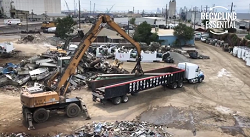ISRI’s 2022 advocacy agenda, which the Board of Directors approved on Tuesday, Jan. 25, focuses on three broad policy actions:
- Recyclable commodities are sustainable materials and recycling is essential to the U.S. and global manufacturing supply chain.
- Recycling is sustainable manufacturing.
- ISRI is recycling—advocating for “responsible recycling that follows recommended industry practices, standards and compliance; engages an inclusive workforce; and emphasizes strong community relationships.”
“The advocacy agenda continues to be an ambitious yet critical platform to guide our work on behalf of our members and the broader recycling industry,” says Adina Renee Adler, ISRI’s vice president of advocacy.
ISRI’s 2022 advocacy agenda includes priorities from 2021. In its continuing efforts to show the essential nature of recycling, ISRI will prioritize educating federal, state, and local governments, and the public on recycling’s important role in the supply chain for infrastructure improvement. The association will continue advocating for:
- Manufacturing sales tax exemptions for recyclers.
- The enforcement of existing trade laws.
- The restoration of recycling industry oversight by the Surface Transportation Board (STB).
- Effective legislation and greater law enforcement collaboration to stop materials theft.
- The recyclability and use of recycled content in manufactured products.
The agenda builds on policy concerns from last year. In 2021, ISRI endorsed investment for infrastructure development that “creates a 21st century system for all modes of transportation and incentivizes the use of recycled content in development projects.” With the recent passage of the bipartisan Infrastructure Investment and Jobs Act that includes the ISRI-led RECYCLE Act, ISRI’s efforts will move several steps further by advocating for “expeditious delivery of federal infrastructure funding to reduce the use of virgin materials in construction.”
To ensure recyclers can deliver sustainable products to achieve the global circular economy, ISRI will prioritize its efforts regarding ocean shipping reform. Ocean shipping concerns grew in 2021 but have plagued shippers for years. The association will advocate for shipping reforms “including greater Federal Maritime Commission (FMC) authorities, to improve supply chain bottlenecks and provide remedies against shipping line market manipulation.”
ISRI will build on its strategies to prevent and mitigate risks from lithium and electric vehicle batteries. The 2022 plan includes efforts to safely and effectively recycle these types of batteries and “reduction and prevention of fire and other risks, such as in partnerships with OSHA [the Occupational Safety and Health Administration] and EPA [the Environmental Protection Agency].”
ISRI recognizes that the recycling industry, like all industries, suffers from increased labor shortages. To address the concern, ISRI’s 2022 agenda includes strategies in workforce development “in collaboration with HBCUs/TCUs [historically Black colleges and universities and Tribal colleges and universities,] community colleges, trade schools, apprenticeships programs, and K-12 schools to develop curriculum and train the next generation of recyclers.”
The agenda is a “living document” that ISRI updates as needed. “The advocacy agenda provides ISRI with the strategic goals and directions to deliver for the membership,” says Billy Johnson, ISRI’s chief lobbyist. Updated information about ISRI’s ongoing advocacy on behalf of the recycling industry can be found here.
Additional Resources













